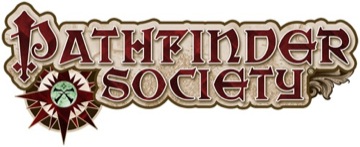There are many wonderful things about being a Game Master, but I think it's fair to say both that filling that role takes practice and that we can make some silly errors while learning. Thinking back to how I GMed before beginning Pathfinder Society Organized Play, I realize that many of the tricks I pulled on my players were downright cruel, such as heaving colonies of rust monsters at the fighter, swarming the bard with wererats until he was infected and under GM control, repeatedly giving one player an intelligent greatsword that would inevitably betray him, having a creature "adopt" the party wizard in a familiar-master bond just so I could kill the familiar and drain the character's Constitution score, and repeatedly tempting the characters to betray the other PCs for power and wealth. Yep, those were some really bad campaigns (yet everyone kept expecting me to be the GM), and I think it's telling that I can remember little of their overarching plotlines. What I can remember, though, are the villains.
In retrospect, I think one villain in particular made me understand what it meant to make an adventure about more than just looting dungeons and killing monsters. He was an orange-clad wizard with a penchant for turning into a falcon, and I initially threw him into the storyline largely for the opportunity to lob a fireball at the 4th-level PCs. The adventurers fought hard and nearly killed the poor spellcaster, but he transformed into a falcon and flew out of the tower, madly screeching incomprehensible promises to get his revenge for their interrupting his nefarious (and largely undefined) plans. A recurring villain was born, but I hardly knew it then.
The PCs shrugged, looted the tower, and went on their way to continue raiding random dungeons and getting themselves into trouble in practically every town—thanks in large part to the paladin constantly catching the chaotic "good" barbarian in the act of killing commoners. Perhaps three character levels later, the tavern they were in exploded, and like any adventuring company worth its salt, the PCs rolled initiative and chased after the mysterious culprit. Thinking their prey cornered in an alleyway, they were surprised to find the dead end empty save for a sealed letter and that wizard standing on top of a building laughing maniacally. "That letter contains the name of the next village I shall burn to the ground," he chortled. "See if you can reach it before I do!" He then shapechanged and flew out of sight, leaving the paladin fuming and the barbarian ambivalent. After reading the message and triggering its explosive runes the barbarian was also thoroughly interested in squashing the spellcaster.
That wizard repeated this at three villages in a row, each time leaving behind a charred husk of a town, a few minions to gnaw on the PCs, and a booby-trapped letter saying where he would strike next. They eventually cornered him in a climatic fight, killed him, and threw his body into a volcano. Unfortunately, the GM had recently read the description for true resurrection, brought back the wizard with new allies, and convinced the aforementioned barbarian to betray the party in return for an unnamed boon. After defeating all but the barbarian, that wizard knocked out the traitor, polymorphed the entire party into rats, and sent them through a trap-filled maze after giving a classic villainous monologue. The story goes on and on, but suffice it to say that this was our recurring villain from levels 4 to 24, and for years afterward, mentioning his name to any of that gaming group would cause them to scowl, grind their teeth, and hoarsely growl "I hate that guy!"
Nearly a decade later when I started playing Pathfinder Society, I found the lack of recurring villains somewhat comforting; by the end of each scenario, the PCs were victorious and had no loose ends to tie up. That was the case, at least, until I played a noteworthy, multi-scenario arc that ended in our perceived failure, for despite our "winning" the scenario, the villains succeeded at their scheme and left behind an insulting letter to add insult to injury. At first I found myself thinking, "What? No way! This can't be right!" A little later that evolved to, "What more could we have done to prevent this," and later still, "Oh, I can't wait to find those guys in the future." I found myself actually enjoying that we didn't have a clean victory because it really made me look forward to encountering those villains again in the future. In a way, I had encountered exactly what I had used against my players years before.
Now that I've cornered you and given you the "let me tell you about my character" spiel, let me share why I subjected you to my rambling stories. When I first started working for Paizo, my mind was swimming with different villains who had tormented the Pathfinders in the past and might one day make a second appearance. Already there are several familiar faces set to show up again in the coming months, and I'm always happy to read about players' memorable experiences with the Big Bad Evil Guy from Scenario #X–YZ. It means the villain connected with the player base and helped to pull participants deeper into the story. It means that I can learn from what went particularly well with that NPC, and it also means that—story permitting—we might see that character again for a rematch.
USING SPOILERS that include the scenario's name so as not to ruin the surprise for someone else, which villains in Pathfinder Society Organized Play have been your favorites? What about the villain really pushed your buttons? Who would you like the chance to meet again?
John Compton
Developer


